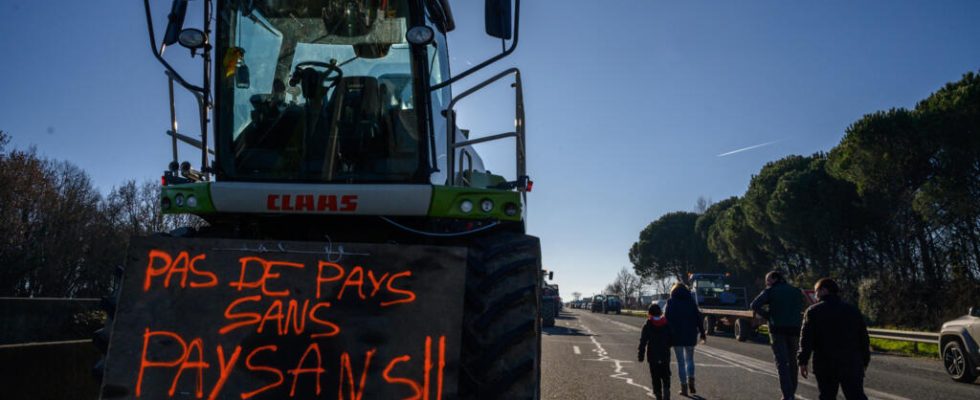Since the fall, discontent has been growing: starting from Tarn, a peaceful movement to overthrow municipal signage has spread throughout France. A way of saying that “#OnMarcheSurLaTête”, a slogan taken from Narbonne to the Belgian border. The tone has hardened in recent days with, since Thursday evening January 18 in Occitania, the blocking of the A64 motorway but also rallies in front of administrations or on roundabouts reminiscent of the revolt of the “yellow vests”.
Increasingly onerous rules and standards
“ Physical hardship has gradually given way to moral hardship which is due in particular to the enactment of rules and standards that are increasingly heavy to bear (…) at a given moment the cup overflows », Launched Étienne Gangneron, president of the Cher Chamber of Agriculture, to Minister of Agriculture Marc Fesneau on Saturday. The unions denounce the government’s slowness in implementing the “ simplification » administrative promised. “ The farmers who call us no longer even know what they are allowed to do or not. » and do not feel “ not adequately supported in the face of climatic, geopolitical and health challenges”, declared to AFP Véronique Le Floc’h, president of Rural Coordination, the second agricultural union. These constraints, to which are added compensation deemed “ too late » for sectors in crisis (viticulture, breeding), ruin “ attractiveness » which the sector needs to renew its aging farm managers.
The rejection of the European “Green Deal”
If France is the first beneficiary of the Common Agricultural Policy (CAP) with 9 billion euros in aid per year, its farmers are contesting with the utmost energy the strategy of greening European agriculture. A central element of the EU Green Deal, a legislative project aimed at halving the use of chemical plant protection products by 2030 (compared to the period 2015-2017), was rejected in the European Parliament at the end of November. But farmers, who welcomed the renewal of the authorization of the controversial herbicide glyphosate, fear seeing the return of this project and intend to weigh in before the European elections in June. French farmers also denounce Brussels’ refusal to extend into 2024 the exemption allowing fallow land to be cultivated (around 4% of agricultural land) while ” food tension caused by the war in Ukraine continues “.
Unfair competition
“ The cost of energy has exploded, the costs of inputs have increased, as have those of labor and animal feed. The war in Ukraine disrupts flows with huge imports into Europe of cereals, poultry and sugar. It disrupts all sectors, it lowers prices », Explained to AFP Christiane Lambert, president of the Committee of Professional Agricultural Organizations of the European Union. “ Our children are served imported foods in canteens that we are forbidden to produce in France. “, she said. The negotiation of free trade treaties (Mercosur) coupled with the imposition of restrictive measures fuels exasperation, she underlines, even if the triggers are different: “ the decline in livestock » in the Netherlands, the “ fuel taxation ” in Germany.
Pesticides and fuel, means of production
Despite good yields, the fall in prices and the maintenance of high charges have reduced the income of cereal growers, who believe that we are “going into the wall” with the government’s new strategy for reducing pesticides Ecophyto 2030. “ban without solution” insists the FNSEA, its mantra for pesticides, water sharing or the gradual increase in taxation on non-road diesel (GNR), “ negotiated in responsibility » with Bercy.
(With AFP)
